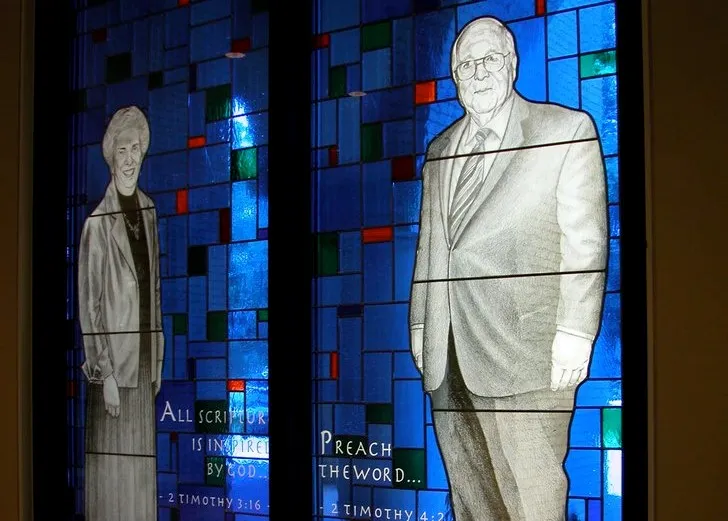
As I neared graduation from a Southern Baptist college and pastored a Southern Baptist church my maternal grandfather had started decades earlier, my mother was fired from the Missouri Baptist Convention. She had accused the executive director of sexual harassment, so he forced her out as controller/CFO and then lied about her in the convention’s publication and in his message at that year’s MBC meeting as I sat in the crowd.
Working in that role had been my mother’s dream job, but it quickly turned into a nightmare. She eventually sued for gender discrimination, retaliation, libel, and slander. The MBC settled the case, and my mother insisted part of the payment go to the Southern Baptist Convention’s International Mission Board to support missionaries.
But the executive director kept his job. As the MBC’s president explained to my mother, they didn’t want to ruin his career. The same concern apparently didn’t exist for hers. The man who said that later served on the Executive Committee of the Southern Baptist Convention where he repeatedly voted — against the wishes of the SBC messengers — not to waive attorney-client privilege in an investigation of how SBC leaders mishandled allegations of sexual abuse.
Years after my mother had been forced out to rebuild her career, the MBC eventually acknowledged the truthfulness of her claims. Amid infighting, some leaders turned against the executive director and went looking for a reason to remove him. That’s when they suddenly noticed her case. But even after they fired him, they offered no apology or restitution to her. They didn’t actually care about her; she was just a pawn in a power struggle.
In addition to his golden parachute from the MBC, the fired man quickly landed a job with the International Mission Board — the place my mother had supported in the outcome of her suit against him. It’s the model the Catholic Church practiced: force out the victims and rotate the abusers to another job paid for from the offering plates.
Two decades have passed, but I’ve thought in recent years a lot about seeing my parents go through that ordeal. They eventually changed churches and lost some friends. Inaccurate articles about my mother still sit online since the SBC’s newswire never updated them despite the MBC later admitting they lied about her.
Now, we also know her experience was unfortunately not an anomaly and paled to the hell many women and men faced in Southern Baptist life. And it’s not just a few pastors here and there. The rot goes all the way to the roots of the modern SBC: Paige Patterson and Paul Pressler.
Patterson and Pressler in 1979 launched an effort to shift the SBC rightward theologically and politically. Called the “fundamentalist takeover” by critics and the “conservative resurgence” by its supporters, the Patterson-Pressler movement remade the nation’s largest Protestant denomination and in turn impacted American culture and politics. Decades after forcing out Baptists they deemed too “liberal” for allegedly not believing the Bible, both Patterson and Pressler have been exposed for their own misdeeds.
Southwestern Baptist Theological Seminary in Texas fired Patterson in 2018 for mishandling allegations of student rapes. His efforts to cover up the wrongdoing and break down women are familiar to my family. Pressler, a retired Texas judge and former head of the Religious Right networking group the Council for National Policy, has been accused in court by multiple men of rape and unwanted sexual advances. These are not just rumors. The SBC in late December settled a case brought by a Pressler victim.
“Pressler is a monster,” an SBC lawyer said in January. “Pressler was/is a dangerous predator who exploited boys based on his power and his false piety. … The man’s actions are of the devil. That is clear.”

A stained-glass window of Nancy and Paul Pressler, which Paige Patterson had installed in the chapel of Southwestern Baptist Theological Seminary in 2011 along with windows of himself and other “conservative resurgence” leaders. The windows were removed in 2019 after Patterson’s firing. (Don Young Glass Studio dyglassstudio.com)
Despite all we now know, SBC leaders continue to praise the movement led by a devilish predator. Rather than fully reckoning with Pressler’s case, SBC leaders in recent weeks have been defending the “conservative resurgence” by attempting to separate it from its creators. That raises an important question: Can good fruit come from a bad tree?
This issue of A Public Witness digs into the recent Pressler news and responses to investigate the roots of the “conservative resurgence” and consider a more appropriate response than just continuing to water the tree.
‘Of the Devil’
Pressler, now 93, may not be a household name outside Southern Baptist life, but we all feel the impacts of his politicking. The rightward shift of the nation’s largest Protestant denomination has impacted American politics and Christianity well beyond Baptist churches.
A Republican activist who served as a judge in Texas for over two decades, Pressler was an influential figure in the rise of the Religious Right during the Ronald Reagan years and beyond. It’s why he received honors like a Texas House Resolution in 2013 that heralded him as “a man of faith … guided by steadfast principles” who “has made contributions to his state and nation that will continue to resonate for many years to come.” He was also the namesake of a planned law school at a Baptist school in Louisiana announced in 2010. The school never opened because of accrediting problems, and its founding dean leaves Pressler’s name off his official biography: U.S. House Speaker Mike Johnson.
Yet, as Pressler gained these accolades and more, people at multiple churches were aware of his predatory behavior. According to a court affidavit filed in 2018, Pressler in 1978 grabbed the penis of a teenage boy in a sauna. Pressler was ousted from his position as youth pastor at a Presbyterian church in Houston, Texas, the next year because church leaders received information about “an alleged incident.” But the church kept the incident a secret.
In 2004, a year after his term as the SBC’s first vice president ended, First Baptist Church in Houston (where he served as a deacon) quietly reprimanded Pressler in a letter for an incident when he, while nude, tried to persuade a young man in the church to also remove his clothes. The incident and the church’s knowledge of it didn’t become public for several years. The church explained in its 2004 letter to Pressler that they worried publicity of his behavior would hurt his witness and work: “Given your stature and various leadership roles in our church, the Southern Baptist Convention, and other Christian organizations, it is our considered opinion that this kind of behavior, if brought to light, might distort your testimony or cause others to stumble.” They didn’t want to hurt his career or the reputation of his SBC movement.
The pastor at the time of the cover-up still leads the congregation. Pressler eventually moved on to another church, Second Baptist, which is pastored by Ed Young Sr. (who became an SBC president thanks to Pressler’s movement and recently called migrants “garbage”).
Also in 2004, Pressler quietly settled a lawsuit against him by a man who says Pressler started sexually assaulting him as a teenager in 1979 and continued to do so for years. The man claims the abuse started after Pressler started teaching his Bible study at First Baptist. In the settlement, Pressler agreed to pay the man $1,500 a month until 2029 (which would’ve totaled nearly half a million dollars). However, Pressler apparently stopped paying so the man brought a new suit in 2017 that brought to light the earlier settlement. And it is that suit, which is ongoing against Pressler, that the SBC settled in December.
As the new suit gained attention, more men came forward. A young lawyer filed a sworn statement in 2018 alleging that two years earlier Pressler had solicited sexual activity. When the man told the office manager of Pressler’s law firm, the manager replied, “This was not the first time that Pressler had acted inappropriately around young men.”
After the SBC recently settled the 2017 case to pay an undisclosed amount to Pressler’s accuser, an attorney for the victim said that his firm had identified new witnesses willing to testify against Pressler.
The allegations against Pressler aren’t rumors. And they’ve been known among some Southern Baptists for decades. According to his victims, when Pressler and Patterson started their crusade to remake the SBC in 1979, Pressler had already been kicked out of one church for sexual assault and that year started a yearslong rape of another teenager. As he spoke in churches trying to win votes for his movement, the greatest threat to the young boys in the audience wasn’t the so-called “liberal” professors at seminaries but the man behind the pulpit.

Paul Pressler speaks about the “conservative resurgence” during an event at Southern Baptist Theological Seminary in Louisville, Kentucky, on March 23, 2004. (Baptist Press)
Help sustain the journalism ministry of Word&Way by subscribing to A Public Witness!
Feigning Ignorance
Shortly after I graduated from college and started writing for news outlets as a graduate student, I started hearing rumors about Pressler making sexual contact with a minor boy. The story came to me from multiple people in Baptist life, but it never included evidence. Some people did mention that a routine federal background check of Pressler had found “ethics problems” in 1989 after President George H.W. Bush nominated him to run the Office of Government Ethics. That derailed his nomination but could’ve been related to other accusations, like the use of court resources and staff for his “conservative resurgence” work.
Since I was on the periphery of Southern Baptist life, I assume those in the inner circle around Pressler also heard the rumors. Perhaps they even saw evidence and their chatter is what eventually rippled out to me. Thus, I find it hard to believe SBC insiders who today claim they didn’t know anything about Pressler’s behavior.
Despite decades of rumors and years of public reports and sworn court statements, Southern Baptist leaders have mostly avoided commenting on Pressler’s pattern of abuse. Since the recent settlement and damning admissions by an SBC attorney, those who have addressed it attempted to defend Pressler’s “conservative resurgence” that led to their own positions of power in SBC life.
That’s the approach of the leading theologian in Southern Baptist life, Southern Baptist Theological Seminary President Al Mohler. For weeks after the SBC’s settlement and admission by the SBC’s lawyer, Mohler remained quiet on the subject even as he hosted his daily news podcast — where he found time to address critical topics facing Christians today like NASA delaying manned missions to the moon, North Korea banning the selling of dog meat, broken toilets at a school in England, and bigfoot. And while he ignored the Pressler news, he still found time to repeatedly attack those supporting female ministers as a slippery slope to LGBTQ+ affirmation.
Mohler finally spoke on the Pressler case after being asked about it during a forum at a church last month. Although Mohler called it “clearly a scandal” and “humiliating to the Southern Baptist Convention,” he added the allegations are “so horrifying that it’s actually very hard to imagine that they could be real.”
Mohler also argued no one could possibly have known about it. As “proof,” he claimed that if any of Pressler’s enemies had heard about this, they would’ve mentioned it. Mohler also claimed he didn’t learn that First Baptist in Houston had two decades ago confronted Pressler about an allegation “until just a few weeks ago,” despite that case receiving significant news coverage last year. A Southern Baptist leader who does a daily news podcast and oversees the editorial section of a major Christian magazine conveniently didn’t see the horrible news about one of his heroes?
Perhaps Mohler’s ability to look the other way shouldn’t be surprising. It’s what he does about the fact that the four founders of Southern Seminary were enslavers and defended slavery, a system that included the constant rape and sexual abuse of people kept in bondage. Mohler calls their slavery a sin but defends their theology, as if the two can be divorced. He even said he would “stand without apology with the founders and their affirmation of Baptist orthodoxy.” A man who studies in a library and preaches in a chapel named for enslavers similarly refuses to reckon with the roots of the “conservative resurgence.” As Pressler himself put it while on Southern’s campus to talk about the success of the “conservative resurgence” in 2004: “It was like Gettysburg, but this time the right side won.” And the crowd laughed and applauded.
Other Southern Baptist leaders tried a similar approach last week. Patterson, who was fired for mishandling allegations of student rapes, insisted that if he had heard the allegations years ago he would’ve tried to find out if it was true and called on Pressler to repent. And Jimmy Draper, who led the SBC’s publishing house when it released Pressler’s memoir, also claimed he knew nothing back then.
While Mohler, Patterson, and Draper imitate the “see no evil, hear no evil, speak no evil” monkeys, others have noted that like me they also heard the allegations for years. Retired Baptist journalist Marv Knox said “rumors of Pressler’s abuse abounded in the SBC at least as far back as 35 years ago.” Similarly, Mark Wingfield of Baptist News Global, who like Knox was a reporter in Southern Baptist life during the time of Pressler’s takeover, wrote yesterday about SBC leaders: “They all feign ignorance, which I find hard to believe because I was a low-level part of that insider network at the time, and I heard the rumors.”
Get cutting-edge analysis and commentary like this in your inbox every week by subscribing today!
Whither the ‘Conservative Resurgence’?
In addition to insisting they knew nothing, the few Southern Baptist leaders to actually speak about Pressler’s abuse usually quickly pivot to also defend Pressler’s “conservative resurgence.”
“What he did can only be called evil, wicked, and distasteful in the highest degree,” Danny Akin, president of Southeastern Baptist Theological Seminary in North Carolina, said last week. “At the same time, I want to make clear that I do believe the Conservative Resurgence was both needed and necessary, and I’m grateful for the fruit that has come from it — even despite the fact persons involved in it were doing terrible things on the personal level.”
With this statement, Akin criticized Pressler’s abuse while still defending Pressler’s actions in SBC life and Pressler’s claims against allegedly “liberal” Baptist professors, pastors, missionaries, and others who lost their jobs because of Pressler’s campaigning. That is, he defends the actions of a man who early in the SBC fight bragged the conservative-fundamentalist camp was “going for the jugular” while personally seeking something much lower.
Pressler led a movement that defamed pastors and scholars, destroyed careers, and drove people out of churches. Once in control, Pressler’s group protected its own, even when they abused children. As my family and many others learned through the years, the good ole boy network consistently sided with preserving their own patriarchal power, the truth and victims be damned.
Can a bad tree really produce good fruit, as Akin argued? Jesus actually answered that question in his Sermon on the Mount: “A good tree cannot bear bad fruit, and a bad tree cannot bear good fruit. Every tree that does not bear good fruit is cut down and thrown into the fire. Thus, by their fruit you will recognize them.”

By their fruit you will recognize Pressler and Patterson. And looking at what Patterson and especially Pressler wrought, the appropriate response is not feigned ignorance, institutional silence, or theologians speaking out of both sides of their mouths. Pressler’s behavior isn’t just something on the “personal level.” It’s who he is. And it’s who the SBC is. He’s their hero.
Baptist Press, the SBC’s newswire, unwittingly chose an apt metaphor in the headline of their piece last week featuring Southern Baptist leaders claiming they knew nothing: “Abuse allegations a blight on Pressler legacy.” The piece started by naming Pressler as “a hero of the SBC’s Conservative Resurgence” before referencing “hints of a darker side to Pressler.” It seems Baptist Press meant the second definition of “blight” found in dictionaries: “something that spoils or has a very bad effect on something.” But the first definition gets us back to thinking about trees and fruit: “a disease that damages and kills plants.”
Tree care experts remind us, “Many tree blight diseases cannot be cured, but it is possible to treat trees affected by blight if you react early enough.” Root rot and heart rot in particular can be fatal. Pressler’s abuse wasn’t treated early. This blight on the “conservative resurgence” has been there since the beginning and affects the roots and heartwood of the movement. The devil’s not in the details but in the design.
A problem this big and systemic is going to take more than a few statements of disappointment and ignorant innocence. Politicians may claim some banks are “too big to fail,” but in this case perhaps we have something too big to repent. It would take a pretty large millstone to put around a $10-billion-a-year organization that consistently sides with predators over children. Nor does it seem like such a group would fit through the eye of that sewing needle. The SBC has been growing in this direction since Pressler and Patterson shaped it. Those two men cannot be excised without taking the whole thing apart.
Perhaps, then, what’s needed is the prophetic word John the Baptist gave the Pharisees and Sadducees: “The ax is already at the root of the trees, and every tree that does not produce good fruit will be cut down and thrown into the fire.”
As a public witness,
Brian Kaylor






